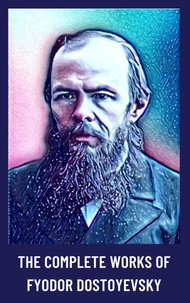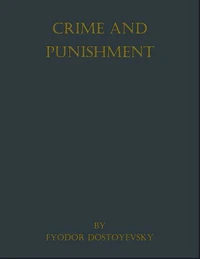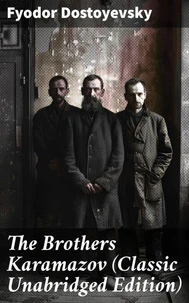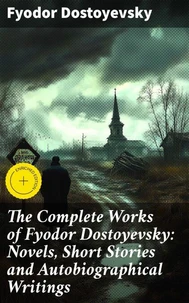The Possessed
Par :Formats :
Disponible dans votre compte client Decitre ou Furet du Nord dès validation de votre commande. Le format ePub est :
- Compatible avec une lecture sur My Vivlio (smartphone, tablette, ordinateur)
- Compatible avec une lecture sur liseuses Vivlio
- Pour les liseuses autres que Vivlio, vous devez utiliser le logiciel Adobe Digital Edition. Non compatible avec la lecture sur les liseuses Kindle, Remarkable et Sony
 , qui est-ce ?
, qui est-ce ?Notre partenaire de plateforme de lecture numérique où vous retrouverez l'ensemble de vos ebooks gratuitement
Pour en savoir plus sur nos ebooks, consultez notre aide en ligne ici
- Nombre de pages510
- FormatePub
- ISBN978-3-96189-857-2
- EAN9783961898572
- Date de parution19/05/2017
- Protection num.pas de protection
- Taille791 Ko
- Infos supplémentairesepub
- ÉditeurChiemsee Verlag
Résumé
The Possessed is a novel by Fyodor Dostoyevsky, first published in the journal The Russian Messenger in 1871-2. It is considered one of the four masterworks written by Dostoyevsky after his return from Siberian exile, along with Crime and Punishment (1866), The Idiot (1869) and The Brothers Karamazov (1880). Demons is a social and political satire, a psychological drama, and large scale tragedy. Joyce Carol Oates has described it as "Dostoyevsky's most confused and violent novel, and his most satisfactorily 'tragic' work." According to Ronald Hingley, it is Dostoyevsky's "greatest onslaught on Nihilism", and "one of humanity's most impressive achievements-perhaps even its supreme achievement-in the art of prose fiction." The Possessed is an allegory of the potentially catastrophic consequences of the political and moral nihilism that were becoming prevalent in Russia in the 1860s.
A fictional town descends into chaos as it becomes the focal point of an attempted revolution, orchestrated by master conspirator Pyotr Verkhovensky. The mysterious aristocratic figure of Nikolai Stavrogin-Verkhovensky's counterpart in the moral sphere-dominates the book, exercising an extraordinary influence over the hearts and minds of almost all the other characters. The idealistic, western-influenced generation of the 1840s, epitomized in the character of Stepan Verkhovensky (who is both Pyotr Verkhovensky's father and Nikolai Stavrogin's childhood teacher), are presented as the unconscious progenitors and helpless accomplices of the 'demonic' forces that take possession of the town.
A fictional town descends into chaos as it becomes the focal point of an attempted revolution, orchestrated by master conspirator Pyotr Verkhovensky. The mysterious aristocratic figure of Nikolai Stavrogin-Verkhovensky's counterpart in the moral sphere-dominates the book, exercising an extraordinary influence over the hearts and minds of almost all the other characters. The idealistic, western-influenced generation of the 1840s, epitomized in the character of Stepan Verkhovensky (who is both Pyotr Verkhovensky's father and Nikolai Stavrogin's childhood teacher), are presented as the unconscious progenitors and helpless accomplices of the 'demonic' forces that take possession of the town.
The Possessed is a novel by Fyodor Dostoyevsky, first published in the journal The Russian Messenger in 1871-2. It is considered one of the four masterworks written by Dostoyevsky after his return from Siberian exile, along with Crime and Punishment (1866), The Idiot (1869) and The Brothers Karamazov (1880). Demons is a social and political satire, a psychological drama, and large scale tragedy. Joyce Carol Oates has described it as "Dostoyevsky's most confused and violent novel, and his most satisfactorily 'tragic' work." According to Ronald Hingley, it is Dostoyevsky's "greatest onslaught on Nihilism", and "one of humanity's most impressive achievements-perhaps even its supreme achievement-in the art of prose fiction." The Possessed is an allegory of the potentially catastrophic consequences of the political and moral nihilism that were becoming prevalent in Russia in the 1860s.
A fictional town descends into chaos as it becomes the focal point of an attempted revolution, orchestrated by master conspirator Pyotr Verkhovensky. The mysterious aristocratic figure of Nikolai Stavrogin-Verkhovensky's counterpart in the moral sphere-dominates the book, exercising an extraordinary influence over the hearts and minds of almost all the other characters. The idealistic, western-influenced generation of the 1840s, epitomized in the character of Stepan Verkhovensky (who is both Pyotr Verkhovensky's father and Nikolai Stavrogin's childhood teacher), are presented as the unconscious progenitors and helpless accomplices of the 'demonic' forces that take possession of the town.
A fictional town descends into chaos as it becomes the focal point of an attempted revolution, orchestrated by master conspirator Pyotr Verkhovensky. The mysterious aristocratic figure of Nikolai Stavrogin-Verkhovensky's counterpart in the moral sphere-dominates the book, exercising an extraordinary influence over the hearts and minds of almost all the other characters. The idealistic, western-influenced generation of the 1840s, epitomized in the character of Stepan Verkhovensky (who is both Pyotr Verkhovensky's father and Nikolai Stavrogin's childhood teacher), are presented as the unconscious progenitors and helpless accomplices of the 'demonic' forces that take possession of the town.






